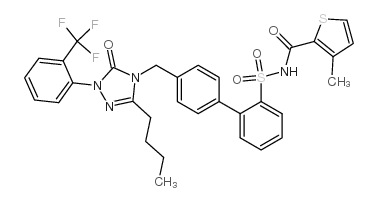| Description |
L-161982 is a selective EP4 receptor antagonist. L-161982 completely blocks PGE2-induced ERK phosphorylation and cell proliferation of HCA-7 cells. L-161982 alleviates collagen-induced arthritis in mice[1][2].
|
| Related Catalog |
|
| Target |
EP4
|
| In Vitro |
L-161982 (10 μM; 2 hours) blocks PGE2-stimulated cell proliferation of HCA-7 cells[1]. L-161982 (10 μM; 1 hour) blocks PGE2-stimulated ERK phosphorylation in HCA-7 cells[1]. L-161982 induces apoptosis, cell cycle arrest, and inhibits prostaglandin E2-induced proliferation in oral squamous carcinoma Tca8113 cells[3]. Cell Proliferation Assay[1] Cell Line: HCA-7 cells Concentration: 10 μM Incubation Time: 2 hours Result: Blocked PGE2-induced cell proliferation.
|
| In Vivo |
L-161982 (5 mg/kg; i.p.; once per day for 2 weeks) reduces arthritis lesions and lesion progression in CIA mice[2]. Animal Model: Female DBA/1 mice of 6 to 8 weeks old (collagen-induced arthritis (CIA) mice model)[1] Dosage: 5 mg/kg Administration: i.p.; once per day for 2 weeks Result: Showed less joint swelling and lower arthritis score after 35 days post immunization.
|
| References |
[1]. Li X, et al.The EP4 antagonist, L-161,982, induces apoptosis, cell cycle arrest, and inhibits prostaglandin E2-induced proliferation in oral squamous carcinoma Tca8113 cells.J Oral Pathol Med. 2017 Nov;46(10):991-997. [2]. Cherukuri DP, et al. The EP4 receptor antagonist, L-161,982, blocks prostaglandin E2-induced signal transduction and cell proliferation in HCA-7 colon cancer cells.Exp Cell Res. 2007 Aug 15;313(14):2969-79. [3]. Chen L, et al. L161982 alleviates collagen-induced arthritis in mice by increasing Treg cells and down-regulating Interleukin-17 and monocyte-chemoattractant protein-1 levels.BMC Musculoskelet Disord. 2017 Nov 16;18(1):462.
|
